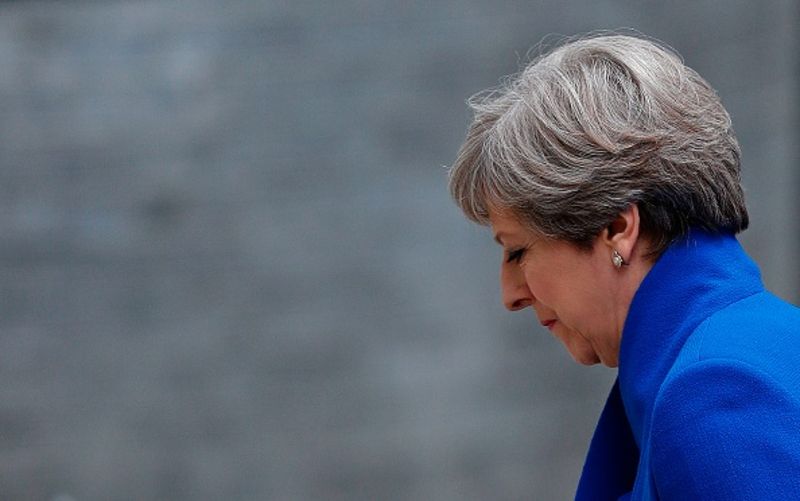The only decent argument in favor of UK Prime Minister Theresa May’s decision not to step down as prime minister after a disastrous election is that the first round of Brexit talks is scheduled for June 19.
The clock has been ticking on the two-year process since March 29, when May triggered Article 50; and May has just wasted two months on a failed election campaign. More delays would almost certainly carry a cost, and there’s something to May’s stated desire to “get on with the job” — but there’s also an edge of desperation to it. European leaders won’t do much to take off that edge; it’s up to May to save herself.
“Get on with the job of government” is the new mantra replacing “strong and stable,” which didn’t play too well in the election: May’s Conservatives lost their majority and are now forced to make a deal with the right-wing Democratic Union Party in Northern Ireland to be able to govern. But on Brexit, May still promises to deliver “stability and certainty,” something sorely lacking from UK politics.
There is, however, no concealing that May really has no clear mandate on how to negotiate anymore. “No deal is better than a bad deal” — something May repeated in her speeches and enshrined in her party’s manifesto — no longer applies because the other parties, and principally Labour, which has improved its representation in the election, are for a softer version of Brexit.
Even Nigel Farage, the former leader of UKIP and one of the architects of the Brexit vote, is now talking of “backsliding” to a Norway-style deal that keeps the UK in the European Union’s common market — and, by implication, allows free movement of labor with the EU. A Turkey-style deal which would keep the UK in the EU’s customs union and outside the common market is also back in play.
As it stands, the “no deal” formula wouldn’t struggle to get through the U.K. parliament. Scottish Tory leader Ruth Davidson, an independent-minded figure within May’s party who actually achieved a measure of success in the election, beating back the anti-Brexit Scottish Nationalists, isn’t likely to lend her 13-strong parliamentary group’s support to the hardliners: They are unpopular in Scotland. Davidson has called for “an open Brexit, not a closed one.”
The DUP, May’s last-ditch coalition partner, is pro-Brexit — but its manifesto stressed its support for the soft border with the Republic of Ireland. Since Northern Ireland, which voted against Brexit last year, is a net recipient of EU subsidies, the DUP would like the “ability to opt-into EU funds where proven to be cost-effective and add value.” None of this is possible with a hard Brexit.
May appears to understand she’ll have to be more accommodating in negotiations now. Though she has reappointed most of her old cabinet and brought back arch-Brexiteer Michael Gove in the relatively unimportant role of environment minister, she has also made Damian Green, an old ally and a vocal “remainer,” her second in command as first secretary of state.
Meanwhile, there is no reason for EU leaders to make May’s life easier. So far, the Brexit-related chaos has helped pro-EU politicians beat nationalist populists in major Western European nations. French President Emmanuel Macron, whose brand-new party has almost secured a historic victory in the French parliamentary election, and Merkel, who is riding high in the polls and is likely to be re-elected in September, have the strong mandates necessary for a pitched battle. If it goes on, it will probably strengthen the chances of Italy’s ruling centrists beating the anti-EU Five Star Movement in the next general election as they did in Sunday’s local polls.
So the initial strategy — playing for time and letting the U.K. punish itself — looks better than ever after the U.K. election. It doesn’t really matter to EU negotiators whom they face across the table — May or her suddenly strengthened rival, Labour leader Jeremy Corbyn or someone else.
It’s up to May to start actually pushing a softer version of Brexit. If she does, the optics for EU leaders of rejecting her approach will be terrible. The EU leaders — both the Brussels bureaucrats led by European Commission President Jean-Claude Juncker — will avoid looking as though they’re kicking May when she’s down. Searching for compromise is, after all, what Europe does by default and what it does best. The reaction in her own party is an entirely different matter.
The worst mistake May can make is to continue pretending she has a strong hand to play. That would cause the EU to lose interest and disengage, letting her fail and expecting the U.K. political process pick them a new negotiating partner with even less time to complete the talks. The strong presence of Brexiters in May’s cabinet makes such a scenario likely — but it’s not too late for May to try to stave it off and put some compromise, Norway-style or Turkey-style proposals on the table.
Bloomberg
